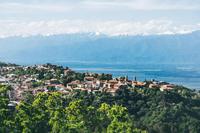Georgia, a country renowned for its varied landscapes and rich cultural heritage, is also home to a network of rivers that weave through its terrain, offering a unique perspective on its geography and history. This article delves into the rivers of Georgia, exploring their significance and impact on the country's ecology, economy, and tourism.
Overview of Georgian Rivers
Georgia's rivers play a crucial role in shaping the country's diverse ecosystems and supporting its agricultural activities. The most prominent rivers in Georgia include the Mtkvari (Kura), Alazani, Rioni, Enguri, and Tergi. Each river has its own unique characteristics and significance, contributing to the country's rich biodiversity and landscape.
Mtkvari (Kura) River
The Mtkvari, known as Kura in Russian and other languages, is the longest river in Georgia, stretching approximately 1,515 kilometers (941 miles). It originates in northeastern Turkey and flows through Georgia before entering Azerbaijan, where it empties into the Caspian Sea. The Mtkvari basin is crucial for Georgia’s agriculture and hydroelectric power production.
Alazani River
Flowing through the fertile Alazani Valley in eastern Georgia, this river is a significant source of irrigation for the region's vineyards and agricultural lands. The Alazani spans around 351 kilometers (218 miles), ultimately joining the Mtkvari River.
Rioni River
The Rioni is the main river of western Georgia, running approximately 327 kilometers (203 miles) before emptying into the Black Sea. It is vital for hydroelectric power generation and supports diverse ecosystems along its course.
Enguri River
Known for the Enguri Dam, one of the world's highest concrete arch dams, the Enguri River plays a critical role in hydroelectric power generation. The river, approximately 213 kilometers (132 miles) long, forms a natural border between the breakaway region of Abkhazia and the rest of Georgia.
Tergi (Terek) River
Originating in the Greater Caucasus Mountains, the Tergi River runs for about 623 kilometers (387 miles), flowing through Georgia and into Russia. It is known for its scenic beauty, especially in the Kazbegi region.
Economic and Environmental Significance
These rivers are not just picturesque elements of the Georgian landscape; they are also integral to the country's economy and environmental sustainability. The Mtkvari and Rioni, in particular, are central to hydroelectric power generation, contributing significantly to Georgia's energy needs. Meanwhile, rivers like the Alazani are vital for agriculture, especially in the renowned wine-producing region of Kakheti.
Tourism also benefits from these rivers, with areas around the Tergi River, for instance, being popular for adventure activities like rafting and kayaking. The unique landscapes along these rivers, from the lush valleys of the Alazani to the rugged terrains of the Tergi, offer diverse experiences for travelers.
The Role in Georgian Culture and History
Georgian rivers have played a pivotal role in shaping the country's history and culture. They have been the lifelines of ancient civilizations, serving as routes for trade and cultural exchange. The Mtkvari River, in particular, has historical significance, flowing through Tbilisi, Georgia's capital, which is a city steeped in history and cultural diversity.
Challenges and Conservation Efforts
While these rivers are crucial for Georgia's ecology and economy, they also face environmental challenges, including pollution and the impact of climate change. Conservation efforts are underway to protect these vital waterways and their ecosystems. The Georgian government, along with various international organizations, is working to implement sustainable practices to ensure these rivers continue to support the country's environmental and economic needs.
Conclusion
Georgia's rivers are more than just water bodies; they are an integral part of the nation's identity, contributing to its economy, culture, and natural beauty. As sources of life and livelihood, these rivers reflect the resilience and diversity of Georgia, making them a significant aspect of the country's heritage.

 Mtkvari River
Mtkvari River
 Pankisi Valley
Pankisi Valley
 Alazani Valley
Alazani Valley




